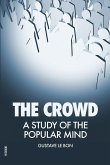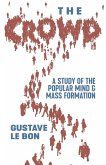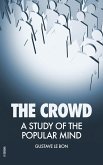- Broschiertes Buch
- Merkliste
- Auf die Merkliste
- Bewerten Bewerten
- Teilen
- Produkt teilen
- Produkterinnerung
- Produkterinnerung
This 1985 book explores both the development of mass psychology and the implications on the political and social life.
Andere Kunden interessierten sich auch für
![The Crowd The Crowd]() Gustave Le BonThe Crowd13,99 €
Gustave Le BonThe Crowd13,99 €![The Crowd The Crowd]() Gustave Le BonThe Crowd16,99 €
Gustave Le BonThe Crowd16,99 €![The Behavior Of Crowds The Behavior Of Crowds]() Everett Dean MartinThe Behavior Of Crowds14,99 €
Everett Dean MartinThe Behavior Of Crowds14,99 €![The Behavior Of Crowds The Behavior Of Crowds]() Everett Dean MartinThe Behavior Of Crowds36,99 €
Everett Dean MartinThe Behavior Of Crowds36,99 €![The Crowd The Crowd]() Gustave Le BonThe Crowd17,99 €
Gustave Le BonThe Crowd17,99 €![Dictate of the collective subconsciousness Dictate of the collective subconsciousness]() Kuno JansonDictate of the collective subconsciousness18,99 €
Kuno JansonDictate of the collective subconsciousness18,99 €![From Crowd Psychology to the Dynamics of Large Groups From Crowd Psychology to the Dynamics of Large Groups]() Carla PennaFrom Crowd Psychology to the Dynamics of Large Groups170,99 €
Carla PennaFrom Crowd Psychology to the Dynamics of Large Groups170,99 €-
-
-
This 1985 book explores both the development of mass psychology and the implications on the political and social life.
Produktdetails
- Produktdetails
- Verlag: Cambridge University Press
- Seitenzahl: 418
- Erscheinungstermin: 11. Oktober 2010
- Englisch
- Abmessung: 229mm x 152mm x 25mm
- Gewicht: 675g
- ISBN-13: 9780521277051
- ISBN-10: 0521277051
- Artikelnr.: 26679361
- Herstellerkennzeichnung
- Libri GmbH
- Europaallee 1
- 36244 Bad Hersfeld
- gpsr@libri.de
- Verlag: Cambridge University Press
- Seitenzahl: 418
- Erscheinungstermin: 11. Oktober 2010
- Englisch
- Abmessung: 229mm x 152mm x 25mm
- Gewicht: 675g
- ISBN-13: 9780521277051
- ISBN-10: 0521277051
- Artikelnr.: 26679361
- Herstellerkennzeichnung
- Libri GmbH
- Europaallee 1
- 36244 Bad Hersfeld
- gpsr@libri.de
Author's note
Introduction
Part I. The Study of the Masses: 1. The individual and the masses
2. The revolt of the masses
3. What do we do when faced with the masses?
4. Eastern and western varieties of despotism
Part II. Le Bon and the Fear of Cowards: 1. Who was Gustave Le Bon?
2. The Machiavelli of mass societies
3. Four reasons for saying nothing
4. The discovery of the masses
5. Mass hypnosis
6. The mental life of crowds
Part III. The Crowd, Women and Madness: 1. Collective matter: the impulsive and conservative crowd
2. Collective form: the dogmatic and utopian crowd
3. The leaders of the crowd
4. Charisma
5. The strategies of propaganda and mass suggestion
6. Conclusion
Part IV. The Leader Principle: 1. The paradox of mass psychology
2. Natural crowds and artificial crowds
3. The leader principle
Part V. Opinion and the Crowd: 1. Communication is the valium of the people
2. Opinion, the public and the crowd
3. The law of the polarisation of prestige
4. The Republic in France: from a democracy of the masses to a democracy of publics
Part VI. The Best Disciple of Le Bon and Tarde: Sigmund Freud: 1. The black books of Dr Freud
2. From classical to revolutionary mass psychology
3. The three questions of mass psychology
4. Crowds and the libido
5. The origin of affective attachments in society
6. Eros and mimesis
7. The end of hypnosis
Part VII. The Psychology of the Charismatic Leader: 1. Prestige and charisma
2. The postulate of mass psychology
3. The primal secret
Part VIII. Hypotheses About Great Men: 1. 'The man Moses'
2. The family romances of great men
3. Creating a people
4. Mosaic and totemic leaders
Part IX. Secular Religions: 1. The secret of a religion
2. The prohibition of thought
3. The cult of the father
Conclusion: the planetary age of the crowd
Notes
References
Index of names
Subject index.
Introduction
Part I. The Study of the Masses: 1. The individual and the masses
2. The revolt of the masses
3. What do we do when faced with the masses?
4. Eastern and western varieties of despotism
Part II. Le Bon and the Fear of Cowards: 1. Who was Gustave Le Bon?
2. The Machiavelli of mass societies
3. Four reasons for saying nothing
4. The discovery of the masses
5. Mass hypnosis
6. The mental life of crowds
Part III. The Crowd, Women and Madness: 1. Collective matter: the impulsive and conservative crowd
2. Collective form: the dogmatic and utopian crowd
3. The leaders of the crowd
4. Charisma
5. The strategies of propaganda and mass suggestion
6. Conclusion
Part IV. The Leader Principle: 1. The paradox of mass psychology
2. Natural crowds and artificial crowds
3. The leader principle
Part V. Opinion and the Crowd: 1. Communication is the valium of the people
2. Opinion, the public and the crowd
3. The law of the polarisation of prestige
4. The Republic in France: from a democracy of the masses to a democracy of publics
Part VI. The Best Disciple of Le Bon and Tarde: Sigmund Freud: 1. The black books of Dr Freud
2. From classical to revolutionary mass psychology
3. The three questions of mass psychology
4. Crowds and the libido
5. The origin of affective attachments in society
6. Eros and mimesis
7. The end of hypnosis
Part VII. The Psychology of the Charismatic Leader: 1. Prestige and charisma
2. The postulate of mass psychology
3. The primal secret
Part VIII. Hypotheses About Great Men: 1. 'The man Moses'
2. The family romances of great men
3. Creating a people
4. Mosaic and totemic leaders
Part IX. Secular Religions: 1. The secret of a religion
2. The prohibition of thought
3. The cult of the father
Conclusion: the planetary age of the crowd
Notes
References
Index of names
Subject index.
Author's note
Introduction
Part I. The Study of the Masses: 1. The individual and the masses
2. The revolt of the masses
3. What do we do when faced with the masses?
4. Eastern and western varieties of despotism
Part II. Le Bon and the Fear of Cowards: 1. Who was Gustave Le Bon?
2. The Machiavelli of mass societies
3. Four reasons for saying nothing
4. The discovery of the masses
5. Mass hypnosis
6. The mental life of crowds
Part III. The Crowd, Women and Madness: 1. Collective matter: the impulsive and conservative crowd
2. Collective form: the dogmatic and utopian crowd
3. The leaders of the crowd
4. Charisma
5. The strategies of propaganda and mass suggestion
6. Conclusion
Part IV. The Leader Principle: 1. The paradox of mass psychology
2. Natural crowds and artificial crowds
3. The leader principle
Part V. Opinion and the Crowd: 1. Communication is the valium of the people
2. Opinion, the public and the crowd
3. The law of the polarisation of prestige
4. The Republic in France: from a democracy of the masses to a democracy of publics
Part VI. The Best Disciple of Le Bon and Tarde: Sigmund Freud: 1. The black books of Dr Freud
2. From classical to revolutionary mass psychology
3. The three questions of mass psychology
4. Crowds and the libido
5. The origin of affective attachments in society
6. Eros and mimesis
7. The end of hypnosis
Part VII. The Psychology of the Charismatic Leader: 1. Prestige and charisma
2. The postulate of mass psychology
3. The primal secret
Part VIII. Hypotheses About Great Men: 1. 'The man Moses'
2. The family romances of great men
3. Creating a people
4. Mosaic and totemic leaders
Part IX. Secular Religions: 1. The secret of a religion
2. The prohibition of thought
3. The cult of the father
Conclusion: the planetary age of the crowd
Notes
References
Index of names
Subject index.
Introduction
Part I. The Study of the Masses: 1. The individual and the masses
2. The revolt of the masses
3. What do we do when faced with the masses?
4. Eastern and western varieties of despotism
Part II. Le Bon and the Fear of Cowards: 1. Who was Gustave Le Bon?
2. The Machiavelli of mass societies
3. Four reasons for saying nothing
4. The discovery of the masses
5. Mass hypnosis
6. The mental life of crowds
Part III. The Crowd, Women and Madness: 1. Collective matter: the impulsive and conservative crowd
2. Collective form: the dogmatic and utopian crowd
3. The leaders of the crowd
4. Charisma
5. The strategies of propaganda and mass suggestion
6. Conclusion
Part IV. The Leader Principle: 1. The paradox of mass psychology
2. Natural crowds and artificial crowds
3. The leader principle
Part V. Opinion and the Crowd: 1. Communication is the valium of the people
2. Opinion, the public and the crowd
3. The law of the polarisation of prestige
4. The Republic in France: from a democracy of the masses to a democracy of publics
Part VI. The Best Disciple of Le Bon and Tarde: Sigmund Freud: 1. The black books of Dr Freud
2. From classical to revolutionary mass psychology
3. The three questions of mass psychology
4. Crowds and the libido
5. The origin of affective attachments in society
6. Eros and mimesis
7. The end of hypnosis
Part VII. The Psychology of the Charismatic Leader: 1. Prestige and charisma
2. The postulate of mass psychology
3. The primal secret
Part VIII. Hypotheses About Great Men: 1. 'The man Moses'
2. The family romances of great men
3. Creating a people
4. Mosaic and totemic leaders
Part IX. Secular Religions: 1. The secret of a religion
2. The prohibition of thought
3. The cult of the father
Conclusion: the planetary age of the crowd
Notes
References
Index of names
Subject index.








